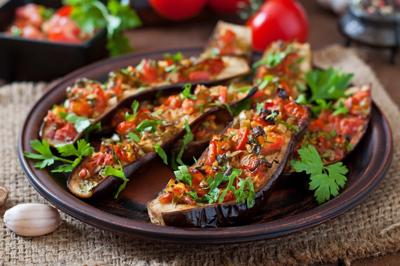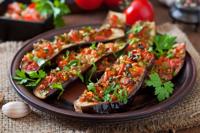The eggplant is a great analogy for human beings. Treat them badly, and they become bitter; treat them right, and they reward you with warm earthiness. One thing is sure: the eggplant certainly divides opinion.
Health platform Positively Probiotic labels them “botanical berries” due to their interior seeds, though their flavor profile makes them vegetables. Nonetheless, it is from the seeds that the eggplant’s acridity comes, causing much of this polarization.
From Bitter to Bold: Eggplant Flavor Profiles
Others might bristle at the mention of eggplant because of the texture: undercooked eggplant is sponge-like, while overcooked eggplant is mushy. In any case, one person’s eggplant Heaven is another person’s culinary Hell.
In truth, the humble eggplant is a versatile, savory, and underrated vegetable that is adept at taking on a wide range of flavors. What’s more, many parts of the world have centuries of eggplant-cooking experience we can all steal for free.
Egypt’s Long Eggplant Connection
A great place to start is the Egyptian eggplant, also known as badingan Masri. This North African variety is simple, involving layers of eggplant, meat sauce, and Pecorino or Parmesan cheese. The recipe makes an excellent option for those wary of the heavy carbohydrate presence in lasagne; it also suits a paleo or Mediterranean diet.
Egypt’s connection to eggplants goes back many years, though their name origin lies in Indian Sanskrit writings from approximately 4000 years ago. In a Wine4Food post, David Rosengarten says, “In Sanskrit, it was called ‘vatinganah,’ which gave rise to later names.” One of those later names is still familiar in most of Europe: aubergine.
He also highlights how a medieval Arabic toxicologist named Ibn Wahshiya once wrote how “eggplant is fatal if eaten raw.” This scientist was either being hyperbolic or he just loathed the bitter taste of undercooked eggplant so much that he slandered the ingredient. To be fair, it is part of the nightshade family, so he wasn’t too far from the truth.
An International Ingredient
In any case, the American derivation of the name stems from an Englishman, who referenced the original strain of eggplants being white (curiously, the English still use the “aubergine” derivation).
Moreover, history dictates language: Italian traders gave it the name melanzana, which translates as “crazy apple.” This still-used moniker stems from a myth that too much eggplant made you insane. Adding their own humorous etymology are Australians, who simply call it “eggfruit.”
A Humble Ingredient With a Rich Tradition
In any case, Egyptians have a close relationship with eggplant, using it for a wide array of dishes. Other renditions of this “crazy apple” also include the following recipes:
- Baba ghanoush, the famous fire-roasted dip with tahini, lemon, and garlic;
- Saltet betingan, fried rounds of eggplant in a tomato, garlic, and parsley sauce;
- Mahshi betingan, small spiced rice-stuffed eggplants cooked in tomato sauce;
- Mesa’a’ah, or “moussaka,” a layered dish using ground beef, eggplant, and potato;
- Eggplant falafel sandwiches;
- Pickled eggplant.
Egypt’s relationship to eggplant goes further than just food on the table. Ancient Egyptians followed a mostly vegetarian diet, according to a Journal of Ethnic Foods study. Eggplants that thrived in the Nile Valley’s fertile soil were celebrated for aiding longevity, preparing Egyptians for a successful afterlife. Having once been considered a peasant’s food, it also unites rich and poor alike now.
Eggplant’s East Asian Variations
If the eggplant’s Middle Eastern story is fascinating, its East Asian version is just as illuminating, and eggplant varieties in the region can be mindblowing. They vary from potent little pea eggplants in Thailand and Sri Lanka to long, slender purple eggplants in Vietnam. India’s genetically modified, generic brinjal (mini, spherical eggplants) are integral to much of the nation’s sustenance.
Perhaps China’s approach to eggplant needs to be more on the radar, highlighting one of the best ways to enjoy it. In many regions, eggplant gets the barbecue treatment, and customers must be patient for the final result.
Barbecued Eggplant in China Is a Must-Try
Barbecue street food spots are scattered across most Chinese cities, giving an irresistible aroma for evening street commuters and late-night beer drinkers alike. Garlic-grilled eggplant (or suànróng kÇo qiézi) is the star of the show for its many fans.
“As far as I’m concerned, this dish is a non-negotiable order,” reads VeganInChina’s review of this obsolete street food. “Even if you don’t like eggplant much in your home country, I’ll place my bets that you’ll end up loving shaokao eggplant.”
The process is simple: the eggplant sits in hot coals (or on the grill) until the skin starts blistering. Next, it is split lengthwise, brushed with chili oil, painted with softened, minced garlic, and dusted with spices and green onions.
While it can take 20 minutes to finish, the result is delectable, smoky, and packed with East Asian soul. Indeed, any visitor to China needs to sample this game-changing eggplant recipe.
Reaping the Health Rewards
Those who can turn the eggplant corner will reap the rewards; recipes such as these will certainly help them get there. Of course, if the flavor upscaling in these eggplant dishes isn’t enough for some, the empirical health benefits could be, not least the purple variety.
Nutrition journal Food & Nutrition Research explains in a review how anthocyanidins and anthocyanins contained in these dark pigments can boost health. The study explains how they can “improve visual and neurological health, and protect against various non-communicable diseases.”
Maybe those Ancient Egyptians were onto something.

















(0) comments
Welcome to the discussion.
Log In
Keep it Clean. Please avoid obscene, vulgar, lewd, racist or sexually-oriented language.
PLEASE TURN OFF YOUR CAPS LOCK.
Don't Threaten. Threats of harming another person will not be tolerated.
Be Truthful. Don't knowingly lie about anyone or anything.
Be Nice. No racism, sexism or any sort of -ism that is degrading to another person.
Be Proactive. Use the 'Report' link on each comment to let us know of abusive posts.
Share with Us. We'd love to hear eyewitness accounts, the history behind an article.